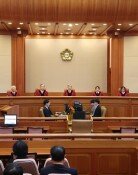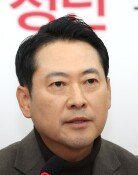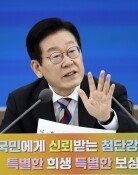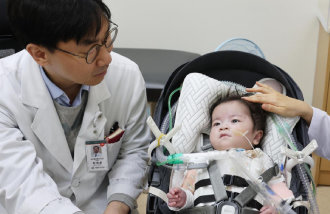The Ruling Partys Newspaper Bill is Full of Outdated Pride and Deception
The Ruling Partys Newspaper Bill is Full of Outdated Pride and Deception
Posted November. 26, 2004 22:53,
While the ruling party and the opposition party brought up their own versions of newspaper and broadcasting law revisions separately for discussion to the Culture and Tourism committee in the National Assembly, the Korean Society for Journalism and Communication Studies (Chairperson Lee Chang-geun, professor of Communication Arts, Kwangwoon University) hosted A Panel Discussion on Journalism Law and its Revision at the Korean Journalism Foundation Training Center at the Korea Press Center on November 26.
Journalistic scholars and the assemblymen who participated in the proposal of the revisions held a heated debate on the issues related to the newspaper and broadcasting bills and the responsibility and the freedom of journalism.
The Newspaper Bill-
Bang Jung-bae, professor of Journalism and Mass Communications at Sungkyunkwan University, criticized the Uri Partys periodical publishing law revision saying, The bill was prematurely produced without thorough research. For example, he claimed that the market share limit clause on the newspaper bill didnt provide proof of the public opinion monopoly abuses when one newspaper has a 30 percent share and the top three newspapers have a 60 percent share of the total.
Yim Sang-won, honorary professor of Journalism and Mass Communications at Korea University, also criticized, The enlightenment influenced newspaper bill proposed by the ruling partys newspaper bill is outdated pride and the Messianism is deception or paranoia. He warned, In 1980, the Journalism Basic Act was thought to be a saviors hand at the time of forced mergers and the abolition of media companies. But the truth wasnt like that, adding, Even if the current ruling power doesnt abuse the newspaper law, there is no guarantee that the next ruling power wont.
Kang Myung-gu, professor in the department of Communication at Seoul National University, pointed out, I cant help thinking that not only the content of the [newspaper] bill but also the way it has progressed were terribly wrong. He explained that the tentative plan, in which journalism is regarded as something which can be revolutionized through a legal revision like the national security law, is political.
The Broadcasting Bill-
Jung Yun-sik, Gangwon Universitys Communications professor, expressed his apprehension about the Uri Partys broadcasting law revisions, which includes establishing mandatory broadcasting scheduling committee participation by the reporting and production staff in public or new channels. When the right of broadcasting scheduling is decided by reporters groups, almost all the channels will have the same progressive voice.
In the meantime, Kim Jae-young, Communications professor at Chungnam University, had a more positive view about the bill saying, When setting up a broadcasting scheduling committee becomes mandatory, it can maintain a vigil over company management and can also challenge one-sided decisions by the owner or senior management.
Professor Jung also raised a concern on a section of the ruling partys broadcasting law revision where it tightens the requirements for a private broadcasting companys license renewal. The reasons of disqualification for the license renewal referral should be clearly stated in the broadcasting law. Otherwise, as in the recent case of the renewal referral process, there will be more concerns about the broadcasting committees arbitrary decision, since the moral and legal decisions are chaotically mingled together.
Professor Kim supported the strengthening of renewal requirements saying, Depending on the characteristics and the role of each broadcasting company such as public, private, local, and national companies, the review and the evaluation of standards should be applied differently.
On the Grand National Partys newspaper freedom bill which enables a newspaper company to own and manage as much as a 10 percent share of a broadcasting company, professor Jung commented, Newspapers public channel management is too untimely for social sentiment, and suggested, Allowing a newspaper company to own shares of the cable and the satellite news channels would be a good alternative.
Konkuk University Journalism professor Kim Dong-kyu observed, Both parties broadcasting bills are the chaotic mixture of public interests and market principles. They dont reflect the changes in the current media environment, and requested, A more serious approach is needed.
Jin-Yeong Lee ecolee@donga.com







